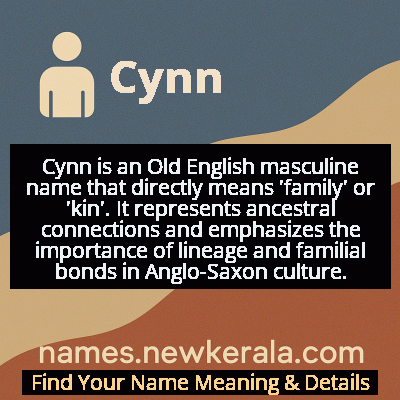Cynn Name Meaning & Details
Origin, Popularity, Numerology Analysis & Name Meaning of Cynn
Discover the origin, meaning, and cultural significance of the name CYNN. Delve into its historical roots and explore the lasting impact it has had on communities and traditions.
Name
Cynn
Gender
Male
Origin
Anglo
Lucky Number
2
Meaning of the Name - Cynn
Cynn is an Old English masculine name that directly means 'family' or 'kin'. It represents ancestral connections and emphasizes the importance of lineage and familial bonds in Anglo-Saxon culture.
Cynn - Complete Numerology Analysis
Your Numerology Number
Based on Pythagorean Numerology System
Ruling Planet
Moon
Positive Nature
Diplomatic, friendly, artistic, empathetic.
Negative Traits
Over-sensitive, moody, indecisive, prone to self-pity.
Lucky Colours
Green, cream, white.
Lucky Days
Monday.
Lucky Stones
Pearl, moonstone.
Harmony Numbers
1, 3, 4.
Best Suited Professions
Diplomats, mediators, caregivers, artists.
What People Like About You
Cooperative spirit, friendliness, artistic talent.
Famous People Named Cynn
Cynn of Mercia
Anglo-Saxon Noble
Recorded in the Tribal Hidage as a prominent Mercian landowner and family patriarch
Cynn Wulfson
Scholar and Scribe
Preserved important Anglo-Saxon manuscripts and maintained family chronicles
Cynn Æthelred
Military Commander
Led family forces in defense against Viking invasions in East Anglia
Name Variations & International Equivalents
Click on blue names to explore their detailed meanings. Gray names with will be available soon.
Cultural & Historical Significance
During the Anglo-Saxon period, names reflecting kinship were particularly valued as they emphasized the collective over the individual, reflecting a society where family honor, bloodlines, and ancestral traditions were paramount. The preservation of such names in documents like charters and the Domesday Book indicates their continued importance through the Norman Conquest and beyond. In modern historical scholarship, Cynn serves as an important example of how Anglo-Saxon naming conventions reflected social structures and values, providing insight into the mentalities of early medieval English society.
Extended Personality Analysis
Individuals named Cynn are typically perceived as deeply family-oriented, loyal, and tradition-minded. They often exhibit strong protective instincts toward their loved ones and maintain close connections with their extended family network. Their personality is frequently characterized by a sense of responsibility to family legacy and a natural inclination toward preserving family traditions and values. Cynns tend to be reliable, steadfast individuals who value stability and continuity in their relationships and endeavors.
They often serve as the 'glue' that holds family units together, demonstrating patience and commitment in maintaining familial bonds. While they may appear reserved to outsiders, they reveal warmth and generosity within their trusted circles. Their decision-making is often influenced by consideration of how choices will affect their family members, and they typically excel in roles that require mediation, preservation of traditions, or caregiving within family structures. This strong familial orientation often extends to their professional lives, where they may gravitate toward careers that involve community building, education, or historical preservation.
Modern Usage & Popularity
In contemporary times, Cynn remains a rare but meaningful choice, primarily among families with Anglo-Saxon heritage or those seeking unique historical names. Its usage has seen a slight resurgence in recent years as part of the broader trend toward reviving Old English and medieval names. While it doesn't appear in modern popularity charts, it's occasionally chosen by parents interested in genealogy or those wanting a name that emphasizes family values. The name is most commonly found in England, particularly in regions with strong historical connections to Anglo-Saxon settlement patterns, and among diaspora communities maintaining British cultural traditions. Modern bearers often appreciate the name's distinctive quality while valuing its deep-rooted connection to concepts of kinship and lineage, making it a choice that bridges historical significance with contemporary family values.
Symbolic & Spiritual Meanings
Symbolically, Cynn represents the enduring power of family bonds, ancestral continuity, and the interconnectedness of generations. It serves as a metaphor for the roots that ground individuals in their heritage while allowing growth into the future. The name embodies the idea that personal identity is inextricably linked to family history and collective memory. In a broader sense, Cynn symbolizes the preservation of traditions, the transmission of values across generations, and the protective strength found in kinship networks. It carries connotations of stability, loyalty, and the fundamental human need for belonging, making it a powerful emblem of how individual lives are woven into the larger tapestry of family legacy and cultural continuity.

